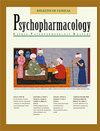Cannabinoid Receptor 1 (CNR1) Gene Polymorphisms in Schizophrenia Patients: Rs6454674 Polymorphism is Associated with Disease Severity
Q Medicine
Klinik Psikofarmakoloji Bulteni-bulletin of Clinical Psychopharmacology
Pub Date : 2015-12-01
DOI:10.5455/BCP.20150502072915
引用次数: 3
Abstract
Objective: The endocannabinoid system contributes to the regulation of emotions, stress, memory, and cognition. It has been reported that endocannabinoids cause GABAergic inhibition and dopaminergic increase in the mesolimbic and nigrostriatal systems, thus playing a part in the neurobiology of schizophrenia. In this study, we investigate cannabinoid receptor 1 (CNR1) gene polymorphisms in schizophrenia patients. Methods: CNR1 gene polymorphisms were studied in 66 schizophrenia patients and 65 healthy controls. To obtain genomic DNA, proteinase K digestion and the salt-chloroform method were used. Clinical Global Impression severity scale (CGI-S) and Positive and Negative Syndrome Scale (PANSS) were administered to evaluate the severity of schizophrenia symptoms. CNR1 gene polymorphism was determined by using polymerase chain reaction (PCR), Restriction Fragment Length Polymorphism (RFLP), and Single Strand Conformation Polymorphism (SSCP) methods for the Rs6454674, Rs806368, and Rs1049353 sites. Results: There was no difference in CNR1 gene polymorphisms between schizophrenia patients and control groups (Rs6454674 T/G; p=0.973, Rs806368 T/C; p=0.349, Rs1049353 A/G; p=1.00). However, CGI-S, PANSS total, PANSS positive, PANSS negative and PANSS general psychopathology scores were significantly lower in schizophrenia patients with RS6454674 polymorphism than in those not showing polymorphism. Conclusion: Our results suggest that CNR1 gene polymorphisms may be associated with clinical symptoms and disease severity in schizophrenia patients.精神分裂症患者大麻素受体1 (CNR1)基因多态性:Rs6454674多态性与疾病严重程度相关
目的:内源性大麻素系统参与情绪、压力、记忆和认知的调节。据报道,内源性大麻素引起中边缘和黑质纹状体系统gaba能抑制和多巴胺能增加,从而在精神分裂症的神经生物学中发挥作用。在这项研究中,我们研究了大麻素受体1 (CNR1)基因在精神分裂症患者中的多态性。方法:对66例精神分裂症患者和65例健康对照进行CNR1基因多态性研究。采用蛋白酶K消化法和盐-氯仿法获得基因组DNA。采用临床总体印象严重程度量表(CGI-S)和阳性与阴性综合征量表(PANSS)评估精神分裂症症状的严重程度。采用聚合酶链反应(PCR)、限制性片段长度多态性(RFLP)和单链构象多态性(SSCP)方法对Rs6454674、Rs806368和Rs1049353位点的CNR1基因进行多态性检测。结果:精神分裂症患者与对照组CNR1基因多态性无差异(Rs6454674 T/G;p=0.973, Rs806368 T/C;p=0.349, Rs1049353 A/G;p = 1.00)。而具有RS6454674多态性的精神分裂症患者的CGI-S、PANSS总分、PANSS阳性、PANSS阴性和PANSS一般精神病理评分均显著低于无多态性的精神分裂症患者。结论:CNR1基因多态性可能与精神分裂症患者的临床症状和疾病严重程度有关。
本文章由计算机程序翻译,如有差异,请以英文原文为准。
求助全文
约1分钟内获得全文
求助全文
来源期刊
CiteScore
0.34
自引率
0.00%
发文量
0
审稿时长
6-12 weeks

 求助内容:
求助内容: 应助结果提醒方式:
应助结果提醒方式:


